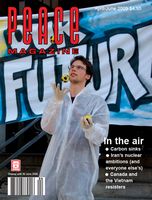
Peace Magazine Apr-Jun 2009, page 7. Some rights reserved.
Search for other articles by Janet Nicol here
Becoming a de-miner wasn't Vera Bohle's career goal after she completed her post-secondary education in Berlin. But when Bohle, aged 36, heard that the Dresden explosives academy offered a training program in land mine clearance, she enrolled.
She was the only woman in her class. After training in 1998, she worked as a de-miner for four years. Now she is an evaluator and technical advisor to disarmament conferences. Over the years she has watched more women don shielded helmets and heavily armored clothes.
Many living in war-ravaged countries need the $760 monthly salary and health benefits that come with this dangerous work. Norwegian People's Aid (NPA) trains and pays local citizens to take out the thousands of deadly mines from the fields and villages of their homes.
The humanitarian group began recruiting females in Kosovo in 1999, breaking the gender barrier of an exclusively male occupation. Money not spent on family is put aside for future dreams--such as a business or education for their children.
But these dreams come with a price, as Saranda Kastrati from Kosovo learned. NPA is supporting her with a new prosthesis because she was injured while clearing mines in Kosovo in 2000.
Using detectors, deminers carefully search and demolish landmines embedded in the farm fields, forests, or outlying land surrounding their homes. In return for their fearless efforts, men and women receive a new-found respect and gratitude from the community.
NPA, founded by Norway's labor movement in 1939, is a leading group in mine action, and urgently campaigned for an international ban on landmines.
Recently NPA made headlines for initiating the first all-female de-mining team in the Middle East. The Jordanian women, aged 20 to 36, are all devout Muslims and wear a veil. They have been contracted by the NPA, along with 150 men, to remove 136,000 landmines between the border of Jordan and Syria.
Sabah Masaeed, one of the team members to successfully complete the six- week training program, revealed in an interview with "Middle East On-line," that her father, a Jordanian shepherd, lost a leg several years ago when he stepped on a landmine. So did her uncle.
"I am not afraid to remove the landmines," Masaeed told Middle East On-line. "And my family has encouraged me to do so. I want to help get rid of this underground danger, which threatens the lives of thousands of people."
Janet Nicol is a teacher and activist in British Columbia.

Peace Magazine Apr-Jun 2009, page 7. Some rights reserved.
Search for other articles by Janet Nicol here